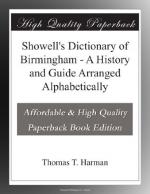Sandwell Hall and Park.—Seat of the Earl of Dartmouth, who frequently permits the Park to be used for public purposes. Of late, however, it has acquired a far greater interest through the discovery of coal underneath its surface. The extension of the coal seams in this direction was long a debateable question, and the originators of the Sandwell Park Colliery Company were deemed by many to be very foolish people to risk their money in such a venture, but after a four years’ suspense their most sanguine expectations were more than realised, and their shares, which at one period were hardly saleable, ranked amongst the best investments of the country. By their agreement with the owner, the Company have the right of mining under an area of 185 acres, at a royalty of 6d. per ton, with the option of taking a further area of 1,515 acres at a like royalty. The first sod was cut April 12, 1870, the thick coal being struck May 28, 1874, at a depth of 418 yards, the shaft, which is 10ft. diameter, being carried down to a total depth of 440 yards—a quarter of a mile; the second shaft, which was commenced June 24, 1874, is 15ft. in diameter. The following are the “winnings”; brooch coal, 2ft. 6in. thick, at a depth of 380 yards; best coal, 20ft. 6in. thick, at 418 yard; heathen coal 4ft. thick, at 427 yards; white ironstone, of excellent quality, at 434 yards, and good fire-clay, 6ft. thick, under that, besides thin seams of gubbin ironstone, and new mine coal.
Saturday Half-holiday.—The introduction of this boon to workingmen took place in 1851, Mr. John Frearson, of Gas-street, claiming the honour of first giving it to his employees.—See “Excursions”.
Scandalous Schoolmasters.—The Rev. Mr. Wills, of Brumingham, with several county esquires and gentlemen, were appointed Commissioners under an Act passed towards the close of “The Long Parliament,” to summon and examine any “publique preachers, inefficient ministers, and scandalous schoolmasters who shall be proved guilty of drunkenness, common haunting of taverns or alehouses, dealing with lewd women, frequent quarrelling or fighting, frequent playing at cards or dice, profaning the Sabbath Day, or do incourage or countenance by word or practice any Whitsun ales, wakes, Morris-dances, Maypoles, stage plays, &c.,” and to remove the same where needed. A little quarrelling or fighting, or playing at cards, was apparently no offence.
School Board.—The first election took place Nov. 28, 1870, there being the following twenty-eight candidates, the first fifteen named being the chosen elected by the number of votes attached to their names, viz., Canon O’Sullivan, 35,120; S.S. Lloyd, 30,799; Dr. Burges, 21,925; Dr. Wilkinson, 19,829; John Gough, 17,481; Rev. F.S. Dale, 17,365; G. Dawson. 17,103; G. Dixon, M.P., 16,897; W. Dale, 16,387; C. Vince, 15,943; J.S. Hopkins, 15,696; W.L. Sargant, 15,683; J. Chamberlain, 15,090; J.S. Wright, 15,007; A.J. Elkington,




